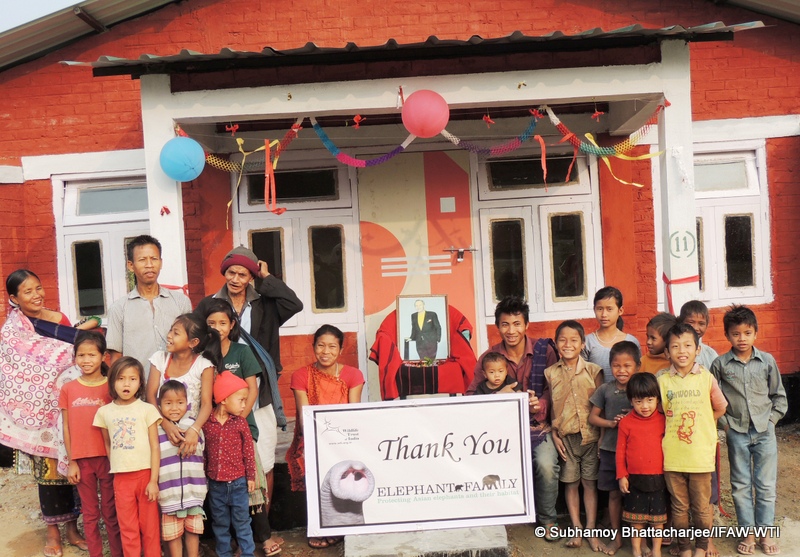New Horizon of Hope for Rehabilitated Village in Assam
New Ram Terang Village, March 27, 2016: Today on the Easter Sunday, the first ray of sun over the New Ram Terang Village ushered in a new horizon of hope and bright future for the recent settlers from Kalapahar-Daigurung elephant corridor.
Kins of 19 families shifted from the designated elephant corridor area of Kaziranga-Karbi Anglong landscape have already started living a success story of conservation initiated some time back by Elephant Family (EF) and Wildlife Trust of India (WTI) with support of Karbi Anglong Autonomous Council (KAAC), Karbi Anglong Forest Department and IUCN-NL.
 Happy villagers posing in front of a house
Happy villagers posing in front of a house
“We are thankful to Jesus for blessing us with a new home” beamed Davidson Ingti, one among the many villagers assembled for the prayer on Easter Sunday. They are celebrating Easter by organizing a community feast in their newfound abode of New Ram Terang. Village women like Florine Terangpi and Anjali Ingtipi are joyously busy in tying the finer details for readying the feast.
New houses, new living rooms, new ambiance on the foothills of Kalapahar presents a picturesque view of the village with green roofs. And the happy faces all around, from that of a child to an elderly person all traditionally dressed, unmistakably speak of the win-win story for one and all to see.
A villager in the process of shifting to his house
All the villagers finally moved to their new houses with all their belongings on Monday, 21stMarch 2016 though they had been busy shifting their household goods and belongings, squeezing out the time for this from their daily routine for the last few weeks. At the moment, they are busy decking up their new houses, sprucing up the living room, bed room, kitchen and the surrounding space. They are excited about starting a new life with a good mix of tradition and modernity.
“We have finally shifted here three days back. Now all are busy in decorating their homes. I am also happy that finally we all have started our new life in New Ram Terang not only to save and secure the elephants but also for a better future for our budding generations”, said Khoi Terang, the village Headman of New Ram Terang.
The green roofs of 19 houses amidst the greenery of Kalapahar Hills, personify the green resolve of the people who left their original settlement right in the middle of the elephant corridor tomake way for the wild elephant herds to freely roam in the landscape.
Dilip Deori, the EF-WTI Project Lead of this first of its kind corridor village rehabilitation in northeast India said, “Normally ruins are not a cause of celebration, but I am happy to see these ruins of the dismantled houses in the elephant corridor. After seven years of constant involvement with the local community finally this project has become a landmark in the elephant conservation history of not only Assam but India too.”
Dilip along with WTI Regional Head Dr Bhaskar Choudhury visited both the old and new village sites and interacted with the villagers sharing their joy and experience of beginning a new lifein a new place.
Apart from 19 new houses, the villagers have been provided 76 Bighas of land for agriculture, tree cultivation, organic fishery, drinking water facility, weaving centre and other green livelihood support.
New Ram Terang Village
New Ram Terang, a small dot in the conservation map of India is now better known for its villagers’ support for a green cause. They voluntarily dismantled their original houses to give free passage to the wild elephants of Kalapahar –Doigurung landscape and shifted to EF-WTI designed new village located away from the elephant corridor.
The noble effort of Elephant Family and Wildlife Trust of India with active support of KAAC and Karbi Anglong Forest Department has set a milestone in the conservation history of northeast India and opened a new window to secure the corridors with win-win results for both- humans as well as elephants in future.
A similar exercise was conducted in Thirunelli – Kudrakote corridor in Wayanad, Kerala where four villages were successfully rehabilitated, helping wildlife return to the corridor and elephant herds using it as a safe passage.
WTI has identified 101 corridors in India and works on four established model methods of corridor securement. After having secured four corridors in almost a decade of work WTI is now part of the Asian Elephant Alliance that is aiming to mobilize resources across the world to help secure the remaining corridors by 2025.